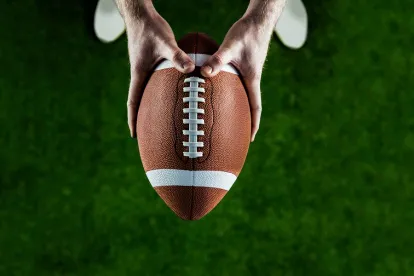Super Bowl Sunday might feel familiar this year with New England making its third consecutive appearance. However, this year’s big game is anything but ordinary as it is the first Super Bowl where sports betting is legal in the United States outside of Nevada.
Legal Sports Betting Rapidly Expands
Thanks to a 6–3 ruling by the Supreme Court of the United States in Murphy v. National Collegiate Athletic Association in May 2018, the federal prohibition of sports betting is a thing of the past. The Supreme Court forever changed the sports world when it held that the Professional and Amateur Sports Protection Act (PASPA) was unconstitutional because it violated the anti-commandeering doctrine under the Tenth Amendment.
That means that for the first time in more than two decades, Nevada no longer has a monopoly on legal sports betting. It also means that employers may want to be aware of the rapidly expanding and changing gambling laws at both the federal and state levels.
Currently, seven states have joined Nevada in launching licensed and regulated sports books in some form. Those states are New Jersey, Delaware, Rhode Island, Pennsylvania, Mississippi, West Virginia, and New Mexico. Additionally, Arkansas voters approved a referendum in November 2018 to expand the state’s gambling offerings to include sports betting, with the first sports books expected sometime in 2019.
Wagering from mobile devices has already dominated the new marketplace in New Jersey. In just seven months, bettors in New Jersey wagered more than $780 million online compared to $446 million in a physical sports book. This trend is likely to continue as more states offer online wagering.
As we have noted before, employers may want to take this opportunity to revisit their Internet and company-issued device use policies and communicate these policies to employees —particularly those located in Nevada and New Jersey where fully mobile wagering is operational. Using company resources to place bets could create performance issues on computer networks, make company data susceptible to security breaches, and distract from an employee’s assigned tasks.
Office Pools
Of course, even in the post-PASPA era, wagering on sports is still very much illegal in more than 40 states. The American Gaming Association estimates that individuals in the United States will wager $6 billion on the Super Bowl this year, with more than 90 percent of those wagers placed illegally. That includes those popular Super Bowl squares that float around some offices this time of year. Wagering, whether in office pools, fantasy sports for money, or a straight bet on the outcome of a game, often violates federal or state law. To eliminate any confusion, employers may want to relay the state law on gambling to employees and define exactly which acts the law permits.
Federal law may be problematic for employers that permit office pools because the Interstate Wire Act of 1961 makes it illegal for individuals to engage in the following activities:
Whoever being engaged in the business of betting or wagering knowingly uses a wire communication facility for the transmission in interstate or foreign commerce of bets or wagers or information assisting in the placing of bets or wagers on any sporting event or contest, or for the transmission of a wire communication which entitles the recipient to receive money or credit as a result of bets or wagers, or for information assisting in the placing of bets or wagers, shall be fined under this title.
What this means is that conducting office pools across state lines or using the Internet in some fashion to complete the pool seemingly violates federal law. One common error that implicates the Interstate Wire Act is permitting employees to pay for participation in Super Bowl squares or office pools via an online payment system.
Although it is unlikely federal officials will enforce the Interstate Wire Act against a small office pool, the current Department of Justice (DOJ) announced in January 2019 that it reinterpreted the Act to cover all forms of interstate online gambling, not just sports betting. Thus, it is safe to assume that with the DOJ’s renewed attention on the Act, employers may want to rethink office pools that cross state lines and/or rely on the Internet for payment.
Super Sick Monday
Between the ups and downs of betting on the Super Bowl and the general post-party fatigue, the Monday after the Super Bowl has become one of the most common sick days of the year. In 2018, it was estimated that 13.9 million Americans would call in sick on the Monday after the Super Bowl, which is roughly 1 in 10 workers.
When managing employee sick time requests, employers generally have two initial considerations: (1) Does the employee have sick time available? (2) Does the employer enforce its sick time policy uniformly and treat all employees equally in terms of their time off requests.
Employers might be able to curb these effects of Super Bowl merriment by creating morale-building opportunities. Employers might, for example, plan a Super Bowl themed celebration on the Monday after Super Bowl Sunday where employees can discuss the highlights of the big game and the best new commercials.




 />i
/>i

